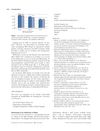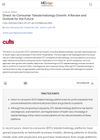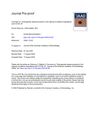 24 citations,
June 2011 in “International Journal of Dermatology”
24 citations,
June 2011 in “International Journal of Dermatology” Most pregnant women experience skin changes like darkening and itching, while serious skin conditions are rare but need early treatment.
3 citations,
April 2022 in “Biomolecules” Higher miR-34a levels and the A variant of the MIR-34A gene are linked to increased risk and severity of alopecia areata.
 6 citations,
April 2013 in “International Journal of Dermatology”
6 citations,
April 2013 in “International Journal of Dermatology” Dermoscopy helps diagnose unusual skin lesions like osteonevus of Nanta and can prevent misdiagnosis of serious conditions.
 2 citations,
August 2020 in “Journal of The American Academy of Dermatology”
2 citations,
August 2020 in “Journal of The American Academy of Dermatology” High incidence of hair loss found in COVID-19 patients, but no severity correlation established.
 May 2014 in “Journal of The American Academy of Dermatology”
May 2014 in “Journal of The American Academy of Dermatology” The project aimed to understand how genetic test results affect patients' actions and feelings in dermatology.
 31 citations,
April 2019 in “Experimental and Therapeutic Medicine”
31 citations,
April 2019 in “Experimental and Therapeutic Medicine” β-blockers can cause skin problems like psoriasis and vitiligo, and doctors should tell patients about these risks.
 7 citations,
April 2022 in “Cutis”
7 citations,
April 2022 in “Cutis” Direct-to-consumer teledermatology is growing fast but raises concerns about quality of care and doctor-patient relationships.
 44 citations,
August 1996 in “Drugs & Aging”
44 citations,
August 1996 in “Drugs & Aging” Mitoxantrone is effective for treating acute leukemia, especially in older patients, with a lower risk of heart damage.
 30 citations,
September 2005 in “Best Practice & Research Clinical Rheumatology”
30 citations,
September 2005 in “Best Practice & Research Clinical Rheumatology” The document concludes that treating tough skin disease in lupus involves sun protection, steroids, antimalarials, and various other therapies chosen based on individual risks and benefits.
34 citations,
January 2022 in “Molecules/Molecules online/Molecules annual” Natural ingredients in cosmeceuticals are beneficial for skin and hair health with few side effects.
 15 citations,
April 2003 in “Journal of dermatology”
15 citations,
April 2003 in “Journal of dermatology” Alopecia areata causes hair loss due to an immune attack on hair follicles, influenced by genetics and environment.
 March 2024 in “Stem cell research & therapy”
March 2024 in “Stem cell research & therapy” Human dental pulp stem cell-conditioned medium, especially from hypoxic conditions, may help treat chemotherapy-induced hair loss and does not increase cancer risk.
 27 citations,
July 2017 in “European Journal of Dermatology”
27 citations,
July 2017 in “European Journal of Dermatology” Certain microRNAs are linked to various skin diseases and could be used to diagnose and treat these conditions.
 May 2013 in “Springer eBooks”
May 2013 in “Springer eBooks” Skin problems in the elderly are unique and may indicate other diseases, involving changes in skin, hair, nails, and increased cancer risk.
 January 1993 in “Side effects of drugs annual”
January 1993 in “Side effects of drugs annual” Natural products like propolis are causing more skin allergies, and certain skin treatments and medications have various side effects and risks.
August 2019 in “International journal of dermatology and venereology” The calcineurin/NFAT pathway plays a significant role in the development and growth of a type of skin cancer called cutaneous squamous cell carcinoma.
 February 2024 in “Skin research and technology”
February 2024 in “Skin research and technology” The research suggests that immune cells and a specific type of cell death called ferroptosis are involved in Frontal fibrosis alopecia.
 4 citations,
August 2020 in “Journal of The American Academy of Dermatology”
4 citations,
August 2020 in “Journal of The American Academy of Dermatology” Hair loss link to COVID-19 severity likely due to other factors.
 March 2021 in “Clin-Alert”
March 2021 in “Clin-Alert” The FDA warned about safety issues with remdesivir and tofacitinib, finasteride is linked to suicidality, potent topical corticosteroids increase osteoporosis risk, henna can cause hemolysis in G6PD deficiency, chemotherapeutic agents can cause adverse reactions, drug interactions are common in cancer patients, ketamine can reduce at-risk drinking, high dose of anticholinergics increases dementia risk in Parkinson's patients, and prenatal exposure to second-generation antipsychotics increases pregnancy complications.
 1 citations,
November 2020 in “Journal of The American Academy of Dermatology”
1 citations,
November 2020 in “Journal of The American Academy of Dermatology” PRP helps treat hair loss effectively with natural methods.
 26 citations,
September 2015 in “Journal of The American Academy of Dermatology”
26 citations,
September 2015 in “Journal of The American Academy of Dermatology” Spironolactone may effectively treat female hair loss, especially with hyperandrogenism signs.
 5 citations,
July 2022 in “Orphanet journal of rare diseases”
5 citations,
July 2022 in “Orphanet journal of rare diseases” RSPO1 mutations in certain patients lead to skin cells that don't develop properly and are more likely to become invasive, increasing the risk of skin cancer.
 1 citations,
June 2023 in “Dermatology and therapy”
1 citations,
June 2023 in “Dermatology and therapy” People with Alopecia Areata have more herpes simplex infections but similar rates of cancer, blood clots, and heart disease compared to those without it.
 100 citations,
September 2016 in “Clinical transplantation/Clinical transplantation.”
100 citations,
September 2016 in “Clinical transplantation/Clinical transplantation.” Voriconazole can cause serious side effects, especially in long-term use.
 June 2006 in “British Journal of Dermatology”
June 2006 in “British Journal of Dermatology” Lower adrenal hormone levels may cause hair loss in postmenopausal women, certain patterns help diagnose nail cancer, and a gene variant linked to higher skin cancer risk in kidney transplant patients suggests monitoring folate levels.
 2 citations,
March 2022 in “Journal of Personalized Medicine”
2 citations,
March 2022 in “Journal of Personalized Medicine” Personalized medicine is important for treating skin disorders, with new treatments and connections to hormones and genetics being explored.
19 citations,
June 2020 in “BMC Cancer” Trichilemmal carcinoma shares genetic changes with other skin cancers, suggesting similar causes and potential treatments.
 11 citations,
January 2016 in “Journal of clinical & experimental dermatology research”
11 citations,
January 2016 in “Journal of clinical & experimental dermatology research” Substance abuse can cause various skin problems, including marks from injections, sores, premature aging, and increased cancer risk.
 56 citations,
January 2019 in “Lancet”
56 citations,
January 2019 in “Lancet” JAK inhibitors help regrow hair in alopecia areata patients, improving their quality of life.
 3 citations,
March 2019 in “Case Reports”
3 citations,
March 2019 in “Case Reports” A man with myotonic dystrophy type 1 had 28 skin cancers, suggesting a link between the disease and skin cancer, emphasizing the need for sun protection and regular skin checks.


























